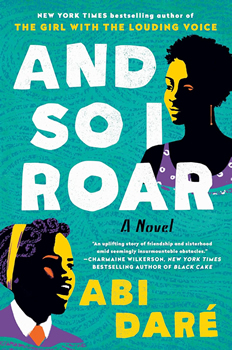Africa Scene: And So I Roar by Abi Daré
 Abi Daré grew up in Lagos, Nigeria, and then moved to the UK to further her education. Her debut novel introduced Adunni, a young girl in Nigeria who refuses to sit around quietly and let things happen to her. The Girl with the Louding Voice was a widely-acclaimed international best seller and has over 100,000 4/5 star reviews on Amazon worldwide.
Abi Daré grew up in Lagos, Nigeria, and then moved to the UK to further her education. Her debut novel introduced Adunni, a young girl in Nigeria who refuses to sit around quietly and let things happen to her. The Girl with the Louding Voice was a widely-acclaimed international best seller and has over 100,000 4/5 star reviews on Amazon worldwide.
The sequel, And So I Roar, which has just been released, is even better. Adunni fled Ikati, her home village in Nigeria, after being accused of the murder of a woman, and has been working as a servant in Lagos ever since. Tia, a well to do woman in Lagos, rescues her from that and arranges for her to go to school. However, a chief from Ikati tracks her down and takes her back to the village for a judgement on the murder. Tia goes with her, but is quite out of her depth in a village in rural Nigeria. The novel is a thriller, but crosses genres to bring us rich characters, a strong sense of place, and a powerful message.
Would you tell us a bit about your background and how you came to write the Adunni novels?

© @Gazmadu
My passion for writing started when I was a child growing up in Lagos, Nigeria. From an early age, I was drawn to stories—whether through books or the drama club in primary school, where I fell in love with creating characters and playing with words. Later, as a teenager, I devoured Famous Five novels, which transported me to new worlds and fuelled my desire to live vicariously through different characters. That early exposure to storytelling really planted the seed for what would later become my passion for writing.
Even though I pursued a degree in law, I always felt a pull toward storytelling. After spending years working in technology, I decided to further hone my craft by earning a Master’s in Creative Writing at Birkbeck, University of London. The idea for the Adunni novels was born out of a desire to give a voice to young girls who are often silenced by societal structures. Adunni’s story represents many young girls in Nigeria whose potential is limited, but whose spirit is unbreakable.
And So I Roar is part thriller, part character study, and part social commentary. What made you decide to write this type of novel?
I’m fascinated by the intersection of personal and societal issues, and I wanted And So I Roar to reflect that complexity. Writing a novel that blends the thriller element with deep character studies allows me to keep the reader engaged while also digging into the emotional and social layers of the characters’ lives. For me, the thriller aspect creates urgency and tension, but the heart of the novel is in the characters’ journeys.
The social commentary came naturally because the issues that Adunni and Tia face—education, gender inequality, societal expectations—are reflective of real-life struggles in Nigeria and beyond. By balancing these different elements, I hoped to create a rich, multi-layered story that provokes thought while also keeping readers on the edge of their seats.
 We know Adunni is very smart and thinks deeply about things despite being young. Her age, naivety, and depth are all displayed by the way she writes and speaks English, clearly her second language. Nevertheless, the narrative flows beautifully. What did you set out to achieve by writing in this way?
We know Adunni is very smart and thinks deeply about things despite being young. Her age, naivety, and depth are all displayed by the way she writes and speaks English, clearly her second language. Nevertheless, the narrative flows beautifully. What did you set out to achieve by writing in this way?
Adunni’s voice is central to both The Girl with the Louding Voice and And So I Roar. Writing in her semi-literate English was a deliberate choice because I wanted readers to experience the world through her eyes, her thoughts, and her expressions. Her language reflects her limited formal education, but it also showcases her intelligence, her sharp mind, and her unique way of seeing the world.
I wanted to challenge the notion that fluency in English equates to intelligence. Adunni may not speak perfect English, but her insights and emotional depth shine through in her words. By writing in this way, I hoped to highlight the value of all voices, regardless of linguistic proficiency, and show that brilliance can come in many forms.

By contrast, Tia is sophisticated and committed to supporting Adunni to obtain a good formal education. Yet she has her own issues—problems with her husband, who is not the first man she loved, and issues with her dying mother. Did you set out to juxtapose the two women in order to show that problems (and solutions) come from the person rather than from social standing and education?
Yes, I deliberately contrasted Adunni and Tia to explore how struggle transcends social class. Adunni is young, poor, and semi-literate, while Tia is educated, wealthy, and seemingly has everything together. But both women are grappling with difficult decisions, identity crises, and emotional challenges. Tia’s problems—her troubled marriage, infertility, and strained relationship with her mother—are just as complex and painful as Adunni’s struggles.
The juxtaposition between the two women illustrates that hardship is not bound by class or education. I wanted to show that no matter how privileged or well-educated you are, life’s difficulties remain deeply personal. The real strength comes from within, from how you navigate those challenges, rather than from your social standing.

And So I Roar is about traditional life in Nigeria but in particular the traditions used to suppress women’s needs and ambitions. However, it is balanced by showing how that suppression has spread in different guises in more modern and supposedly sophisticated environments. Is that part of the novel’s message?
Absolutely. One of the core messages of And So I Roar is that oppression can take many forms. In traditional rural settings, the suppression of women may be more visible—like forced marriages or denying girls access to education. But in more modern, urban environments, oppression can be subtler, manifesting through societal expectations, gender roles, and personal sacrifices that women are expected to make.
In the novel, Tia represents this modern form of oppression. Despite her education and success, she still faces societal pressure around fertility and marriage. Through these two characters, I wanted to show that the struggle for women’s rights and equality is universal, and it often takes different forms depending on the context.
 After Adunni is taken back to her village and waits for judgment at midnight under a full moon, the tension ramps up as the clock ticks down. The reader knows something awful will happen but is unclear just what that will be. Did you set that up so that the actual outcome is an even bigger surprise to the reader, yet inevitable in retrospect?
After Adunni is taken back to her village and waits for judgment at midnight under a full moon, the tension ramps up as the clock ticks down. The reader knows something awful will happen but is unclear just what that will be. Did you set that up so that the actual outcome is an even bigger surprise to the reader, yet inevitable in retrospect?
Yes, the build-up of tension was very intentional. I wanted the reader to feel the same dread and anxiety that Adunni feels, knowing that something terrible is about to happen but unsure of exactly what. By creating this suspense, I hoped to keep the reader engaged while also heightening the emotional impact of the eventual outcome.
When the truth is revealed, I wanted it to feel both surprising and inevitable. It’s one of those moments where, looking back, all the clues were there, but the reader couldn’t fully predict what was coming. That’s what makes the reveal even more powerful—when everything clicks into place, it feels like it was always meant to happen, even if you didn’t see it coming.
Are you working on another Adunni novel, or will you be moving on to a new project? Either way, would you tell us a little about it?
While I love Adunni and her story, I am currently exploring new projects and I’m excited to dive into different narratives.
Right now, I’m focused on continuing to write stories that challenge and inspire.
To learn more about the author, please visit her website.
- A Death On Lord’s Day - November 19, 2024
- Africa Scene: Abi Daré by Michael Sears - October 4, 2024
- International Thrills: Fiona Snyckers - April 25, 2024
